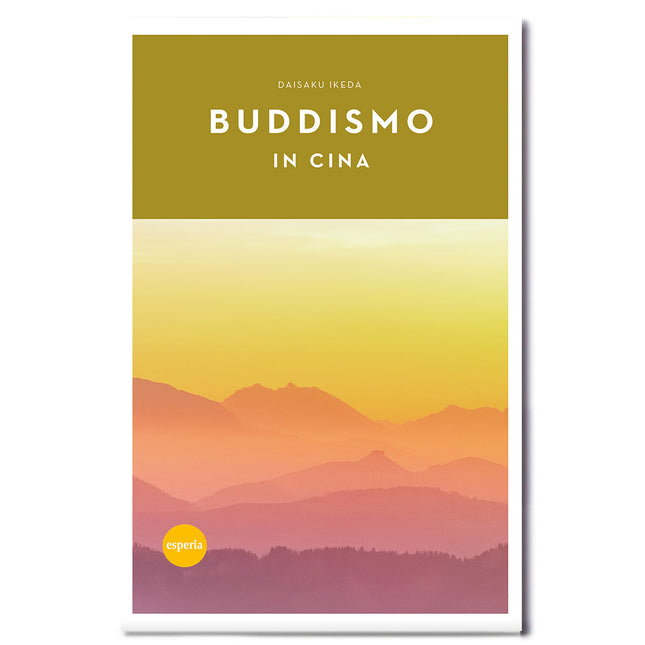
Storia del Buddismo e Soka Gakkai
-

Esperia Il risveglio del Budda
Clark Strand, ex monaco zen, giornalista e scrittore statunitense, ci guida alla scoperta della Soka Gakkai e del Buddismo di Nichiren da una prospettiva inedita: quella di un simpatizzante “non convertito”. Strand sottolinea che la forza della Soka Gakkai, che in pochi decenni è diventata un movimento globale, sta nel fondamentale strumento delle riunioni di discussione, basate sulla condivisione delle esperienze e sull’incoraggiamento reciproco. Nel suo viaggio all’interno di un movimento e di un insegnamento che hanno spesso generato malintesi e incomprensioni nelle altre scuole buddiste, Strand parte da Makiguchi, l’educatore che si oppose al militarismo, per poi ritrarre il suo discepolo Toda e la sua intuizione di chi o cosa fosse davvero il Budda, e arrivare alla visione globale di Ikeda e alla sua ridefinizione del ruolo di religione. Il quadro che ne esce rivela qualità e punti di forza di cui spesso nemmeno i membri dell’associazione sono consapevoli, e indica la Soka Gakkai come esempio di un movimento moderno e votato al bene del genere umano.
€9,00
-

Esperia edizioni Buddismo in Cina
Il presente volume, il terzo della serie sulla storia del Buddismo edita dalla Soka Gakkai, descrive l’affascinante percorso di trasformazione del Buddismo in una religione mondiale attraverso la sua diffusione dall’India, la terra natale del Budda, alla Cina e oltre.L'autore Daisaku Ikeda, presidente della Soka Gakkai Internazionale, racconta, attraverso una vivace narrazione, le vicende dei commercianti e dei monaci che per primi portarono il Buddismo in Cina lungo la Via della Seta, così come la vita dei maestri buddisti cinesi di quel tempo, lo sviluppo delle varie scuole buddiste - soprattutto la scuola Tiantai, che esercitò in seguito una grande influenza in Giappone - e il successivo declino del Buddismo in Cina dopo le aspre persecuzioni che lo colpirono nel X secolo.Nel testo, la saggezza e la visione di figure chiave come il grande traduttore Kumarajiva e il maestro buddista Tiantai Zhiyi vengono messe in primo piano e in questo modo l'autore offre significative riflessioni sul ruolo del Buddismo nella società cinese e, per estensione, nel suo complesso, e traccia la rotta che la religione dovrebbe seguire per rispondere ai bisogni dei tempi, allora come adesso.
€11,00
-

Esperia Daisaku Ikeda in Europa
Una raccolta di estratti dalla Nuova Rivoluzione Umana sui viaggi del presidente Ikeda in Europa e in Italia.
€5,00
-

Esperia Buddismo, il primo millennio
Il volume affronta lo sviluppo del Buddismo dopo la morte del suo fondatore Shakyamuni. A partire dal primo concilio, organizzato dai discepoli diretti di Shakyamuni, che mise ordine nel complesso sistema degli insegnamenti del Budda, fino alla nascita del movimento Mahayana, le cui origini restano poco definite. Daisaku Ikeda esamina le scarse notizie storiche giunte sino a noi e le interpreta con l’originalità e l’intuizione che lo caratterizzano. Espone i principi essenziali del Sutra del Loto, la scrittura fondamentale del Grande Veicolo e ripercorre le vicende di alcuni protagonisti della storia del Buddismo: il re Ashoka e i filosofi Nagarjuna e Vasubandhu, che contribuirono alla sua affermazione come una delle principali religioni mondiali.
€11,00
-

Esperia La vita del Budda
Una biografia interpretativa del Budda storico, Shakyamuni. Daisaku Ikeda, leader e pensatore buddista dei nostri giorni, tenta di risalire, utilizzando le scarse informazioni biografiche relative a Gautama Siddharta, detto Shakyamuni o il Budda, alle motivazioni che hanno spinto un uomo che aveva a sua disposizione ogni ricchezza e privilegio terreno, ad abbandonare palazzi, titolo principesco, moglie e figlio. Lo fece, probabilmente, in reazione alla scoperta delle sofferenze fondamentali della vita, che non vengono risparmiate nemmeno a chi gode di un’esistenza privilegiata. Ikeda ripercorre i passi del giovane alla ricerca dell’illuminazione che può liberare l’essere umano da ogni vincolo di sofferenza, impegnandosi in una ricerca basata sulle scarse fonti e sulla propria esperienza di praticante buddista. Ciò che spinse quasi tremila anni fa Gautama Siddharta a intraprendere una lotta durissima al fine di superare l’impermanenza della vita e trovare la felicità suprema rappresentata dal “risveglio”, o Buddità, può essere ancora valido al giorno d’oggi? Il suo messaggio, che ha cambiato la vita di milioni di persone nei secoli in tutto l’Oriente, può ispirare anche l’Occidente? L’autore, e noi con lui, crede di sì e ci aiuta a comprendere quale sia l’essenza dell’illuminazione del “Risvegliato”. Il titolo originale dell'opera, La mia visione di Shakyamuni, suggerisce lo spirito con il quale l’autore si è avvicinato al Budda storico, vissuto in India circa venticinque secoli or sono. I dati sulla sua vita infatti sono pochissimi e le uniche fonti sono testi tramandati per secoli soltanto in forma orale. Ricostruire la vita del “Saggio degli Shakya” significa quindi cercare di andare ben al di là di quanto le notizie e i racconti agiografici ci tramandano, e compiere un notevole sforzo di interpretazione delle molte importanti scelte che Shakyamuni operò nel corso della sua vita. Ikeda compie questo percorso sulla base della propria esperienza di leader religioso contemporaneo ed è proprio in virtù di questo ruolo che ci guida a comprendere quale sia il significato più profondo dell'illuminazione del “Risvegliato”.
€11,00
-

Esperia Il buddismo della gente
Questo libro trova le radici nella necessità di voler approfondire le vicende storiche che hanno portato la Soka Gakkai ad emanciparsi dal clero della Nichiren Shoshu e quali sono i suoi intenti quale associazione religiosa laica che promuove concretamente la pace, la cultura e l’educazione in tutto il mondo. La prima parte del volume offre una visione d’insieme della storia del Buddismo, della Nichiren Shoshu e dei suoi patriarchi fino ai giorni nostri, con particolare riguardo alla narrazione degli eventi che hanno condotto in tempi recenti alla separazione. La seconda parte invece affronta gli aspetti dottrinali, nello specifico: il Gohonzon come oggetto di culto per la felicità di tutta l’umanità; la cerimonia di Gongyo, il significato della pratica quotidiana; gli Scritti di Nichiren Daishonin, la stesura e le traduzioni. Gli argomenti trattati, sviluppati anche sulla base di fonti esterne alla Soka Gakkai, mirano a rendere questo testo un agile strumento di consultazione non solo per chi desidera avere una panoramica esaustiva sulle vicende con la Nichiren Shoshu, ma anche per chi necessita di reperire informazioni di carattere filosofico-religioso.
€5,00







